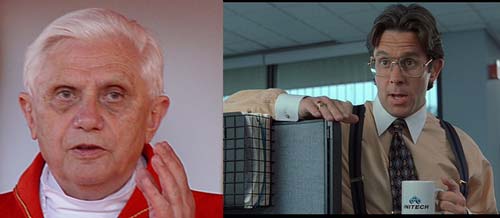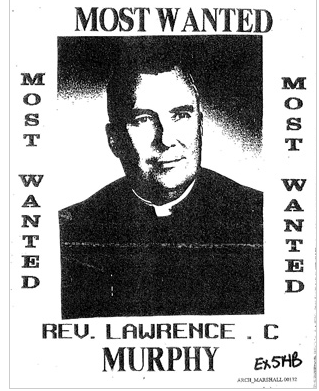Ross Douthat, the cherubic Catholic on the NYT’s column head, tries to take a stab at his church and its recent spate of sex scandal revelations:
There has been some accountability for the abusers, but not nearly enough for the bishops who enabled them. And now the shadow of past sins threatens to engulf this papacy.
Popes do not resign. But a pope can clean house. And a pope can show contrition, on his own behalf and on behalf of an entire generation of bishops, for what was done and left undone in one of Catholicism’s darkest eras.
This is Holy Week, when the first pope, Peter, broke faith with Christ and wept for shame. There is no better time for repentance.
Douthat is rightfully taking flak from commenters for trying to blame some of the scandal on the “silly season of the ’70s”, as if disco clubs and second-wave feminism were gateways for priests to molest boys in the confessional (as one commenter points out, the moral progressivism of the 70s, which presumably weakened the Church’s influence, may have helped give victims an opening to speak out).
But if I were to be the devil’s advocate, I’d point out this passage in Douthat’s column as one to raise doubts about the holiness of the Catholic church:
There are two charges against Benedict XVI: first, that he allowed a pedophile priest to return to ministry while archbishop of Munich in 1980; and second, that as head of the Vatican’s Congregation for the Doctrine of the Faith in the 1990s, he failed to defrock a Wisconsin priest who had abused deaf children 30 years before.
The second charge seems unfair. The case was finally forwarded to the Vatican by the archbishop of Milwaukee, Rembert Weakland, more than 20 years after the last allegation of abuse.
One of the supposed upsides of having a papacy is that the Pope is presumably the supreme decider, as direct a link to God’s authority as we can have on earth. He definitively settles doctrinal and moral matters, and his words and his mind are pretty much in tune with God’s, and no one who believes in the supremacy of the Catholic Church should have any doubt otherwise.
So, basically, one of Douthat’s (and the official Vatican spokesperson’s) defenses is that, well, the man who was destined to be God’s infallible voice, didn’t stop a man (Father Murphy in Wisconsin) from molesting 200 deaf boys because the relevant memo didn’t get to him (or to the Pope at the time) soon enough.
This Times interactive timeline about how Father Murphy got away is worth clicking through. Here are some of the important dates (after the last known-allegations against him):
– In Dec. 1993, Father Murphy is evaluated by the archdiocese.
– Three years later, the Milwaukee archbishop gets around to writing a letter to Ratzinger’s office.
– About half a year later, the pre-trial proceedings get held up because they’re arguing over the statute of limitations (which, according to one interpretation of canon law, is as short as 30 days).
– About a year later from when the Milwaukee archbishop’s wrote a letter to Ratzinger, it finally is received by whoever is supposed to forward mail to Ratzinger’s office.
– Another year passes, and Ratzinger’s secretary recommends that Father Murphy be allowed to live the rest of his years in dignity. In the July of 1998, the Vatican sends its meeting notes to Wisconsin…and it takes about a month for them to get translated from Italian to rough English.
– In August, the Milwaukee Archdiocese puts Murphy out to pasture, promising, with almost hilarious understatement, that he plans on “strengthening the precepts that have already been placed upon Father Murphy…to assure that Father Murphy does not continue to seek contact with members of the deaf community, which often in the past has resulted in considerable dismay in the deaf community.”
– A few weeks later, Father Murphy dies. In defiance of church orders, his family gives him an open-casket funeral, with him decked out in full vestments, with invites sent out to the deaf community.
The most passionate of anti-Catholics would argue that the Church was actively covering up, and maybe even encouraging the abusive behavior of its pedophile priests. But it’s understandable how even an ardent Catholic, after reading the above-trove of documents, might conclude that the Vatican may not be covering up for predators, but it sure is dependent on an all-too human, painfully-slow bureaucracy, in which church officials spend as much time arguing over interpretation of church rules as they do criminal law and important letters are being sent over by courier in diplomatic pouches, and yet still take a year to get to the relevant official’s secretary (in another case of an abusive priest, the memo never got forwarded at all, according to the Vatican).
And even when it does reach the right official, Ratzinger in this case, there’s no guarantee that there’s enough hours in the day for him to get to it (though he did find time to punish and force a priest out of the priesthood for participating in a peace protest). If only Skype had been invented back then, maybe Father Murphy would have been punished before he was too old, as the church judged, to deserve the indignity of a trial.
I think most mature believers come to realize that, for the most part, God shouldn’t be expected to deliver miracles in quite the same immediate and dramatic fashion as depicted in the Bible. But after the case of the future Pope Ratzinger and Father Murphy, now young believers have to accept that not only will God (and his human proxy) not strike down the most evil of sinners (Matt 18:6: but whoever causes one of these little ones who believe in Me to stumble, it would be better for him to have a heavy millstone hung around his neck, and to be drowned in the depth of the sea)…He may not even make sure that the memo gets forwarded.
The other alternative is that Ratzinger (and the Pope before him) did receive and read the memos, and then did nothing. The Vatican and Douthat don’t have much wiggle room between trampling on Catholic and Christian theology, and offending basic human sensibilities.


Pingback: The banality of Godliness: The Vatican and Sex Scandals and a Slow …
Pingback: The Pope as a Manager, part II | Danwin: Dan Nguyen, in short